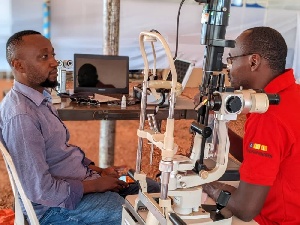- Home - News
- Elections 2024
- News Archive
- Crime & Punishment
- Politics
- Regional
- Editorial
- Health
- Ghanaians Abroad
- Tabloid
- Africa
- Religion
- Photo Archives
- Press Release
General News of Friday, 11 April 2025
Source: www.ghanawebbers.com
'If the Finance Minister doesn’t get it right…' - AGI Boss warns of fallout from Trump tariffs
The President of the Association of Ghana Industries (AGI) has issued a warning. He is concerned about the economic impact of a new 10% tariff on cocoa exports to the U.S.
Dr. Humphrey Ayim-Darke emphasized that the Finance Minister must act quickly. He believes decisive action is needed to prevent a fiscal crisis.
In an interview on PM Express Business Edition, he discussed the stakes involved. He stated, “If he doesn’t get it right, balancing his books will be tough.”
He added that government revenue largely depends on imports and cocoa exports. There is significant concern about ensuring stability in the cocoa market.
The U.S. tariff was announced by President Joe Biden. This decision has created uncertainty for one of Ghana’s key export commodities. It threatens government revenue, foreign exchange stability, and inflation.
Although the U.S. has paused the tariff for 90 days, Dr. Ayim-Darke sees this as temporary relief. He said it gives Ghana time to consult and respond strategically.
“It is still unfolding,” he noted, “but we would have faced higher anxiety without this pause.”
Currently, they are consulting with government and regional partners for a collective response. Dr. Ayim-Darke stressed that now is not the time for solo actions or public grandstanding.
He warned against issuing statements that could disrupt the system. A unified approach would be more beneficial for Ghana at this time.
Dr. Ayim-Darke highlighted how cocoa exports relate to import-based revenue and fiscal health. He explained that over 50% of domestic revenue comes from ports and imports, including cocoa exports.
He also mentioned challenges faced by cocoa production due to illegal mining activities (galamsey).
If government revenue declines, there could be serious consequences for the economy. “It has a ripple effect on macroeconomic stability,” he said.
He warned that insufficient domestic revenue could lead to increased monetary policies affecting interest rates and currency value.
Additionally, rising inflation in the U.S. could impact remittance flows to Ghanaian families. If inflation reduces disposable income in America, remittances may decline as well.
Dr. Ayim-Darke raised concerns about tariff disparities between Ghana and Côte d’Ivoire—Ghana faces a 10% tariff while Côte d’Ivoire faces 14%.
He cautioned against complacency regarding these differences in tariffs between both countries.
“We need to harmonize our total cocoa export benefits,” he stated firmly.
He believes this issue cannot be viewed in isolation; both macro and micro perspectives are important.
As the 90-day countdown begins, Dr. Ayim-Darke insists strategic action is crucial now. Decisions made in these weeks will significantly affect Ghana's economic future.











